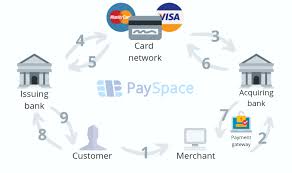Payment processing is an essential aspect of any business that accepts payments from customers. It is the process of collecting, verifying, and transferring funds from a customer’s account to a merchant’s account. Payment processing can be done through various methods, including credit cards, debit cards, bank transfers, and online payment systems.
One of the primary benefits of payment processing is that it allows businesses to accept payments from customers without the need for cash or checks. This not only provides convenience for customers but also reduces the risk of theft and fraud for businesses.
Credit card processing is one of the most popular forms of payment processing. When a customer makes a purchase using their credit card, the merchant sends a request to their bank to verify that the customer has sufficient funds to complete the transaction. If approved, the funds are transferred from the customer’s account to the merchant’s account within a few days.
Debit card processing works similarly but instead deducts funds directly from the customer’s bank account. This method is often preferred by customers who want to avoid credit card debt.
Online payment systems such as PayPal and Stripe have also become increasingly popular in recent years. These systems allow customers to make payments using their credit or debit cards or even directly from their bank accounts. Online payment systems offer added convenience for both customers and merchants by allowing transactions to be completed quickly and securely online.
One important consideration for businesses when choosing a payment processor is security. Payment processors must comply with strict security standards to protect sensitive financial information during transactions. Merchants should look for processors that offer encryption and other security features to ensure that their customers’ information is kept safe.
In conclusion, payment processing plays a vital role in modern commerce by allowing businesses to accept payments quickly and securely from customers all over the world. Whether through credit cards, debit cards, bank transfers, or online payment systems, businesses must choose reliable processors that meet strict security standards to protect both themselves and their customers.
Frequently Asked Questions About Payment Processing: Your Top 5 Concerns Answered
- What payment methods do you accept?
- How secure is my payment information?
- How long does it take for a payment to process?
- Is there a fee for processing payments?
- Can I set up automatic payments?
What payment methods do you accept?
We accept all major credit cards, PayPal, and Apple Pay.
How secure is my payment information?
The security of your payment information depends on the payment processor and the measures they have in place to protect your data. However, most reputable payment processors use advanced security measures to ensure that your payment information is kept safe.
One of the primary ways that payment processors protect your information is through encryption. Encryption is a process that converts sensitive data into a code that can only be deciphered by authorized parties. This means that if someone were to intercept your payment information during a transaction, they would not be able to read it without the encryption key.
Another way that payment processors protect your information is through tokenization. Tokenization is a process where sensitive data such as credit card numbers are replaced with a unique identifier called a token. This token can be used for future transactions, but it does not reveal any sensitive data about the customer’s account.
Payment processors also typically comply with strict security standards such as the Payment Card Industry Data Security Standard (PCI DSS). This standard sets requirements for merchants and service providers to protect cardholder data during transactions.
In addition to these measures, many payment processors offer fraud detection and prevention services. These services use machine learning algorithms and other techniques to analyze transaction patterns and identify potentially fraudulent activity.
Overall, while no system can guarantee 100% security, most reputable payment processors take extensive measures to protect your payment information during transactions. If you have concerns about the security of your payments, you should choose a trusted and reputable processor and review their security policies carefully.
How long does it take for a payment to process?
The time it takes for a payment to process can vary depending on the payment method and the specific circumstances of the transaction.
For credit card payments, the processing time can range from a few seconds to several days. Typically, when a customer makes a purchase using their credit card, the merchant sends a request to their bank to verify that the customer has sufficient funds to complete the transaction. If approved, the funds are transferred from the customer’s account to the merchant’s account within a few days.
Debit card payments are usually processed more quickly than credit card payments because they deduct funds directly from the customer’s bank account. This means that transactions can often be completed in real-time or within a few hours.
Bank transfers and online payment systems such as PayPal and Stripe can take longer to process, sometimes up to several business days. This is because these methods involve transferring funds between different financial institutions and may require additional verification steps.
It’s important for businesses and customers alike to be aware of potential processing times when making or receiving payments. If you’re uncertain about how long it will take for a payment to process, it’s always best to check with your bank or payment processor for more information.
Is there a fee for processing payments?
Yes, there is usually a fee for processing payments. Payment processors charge a fee to cover the costs of verifying and transferring funds, as well as to make a profit. The fees vary depending on the payment method used and the processor chosen. For example, credit card processing fees can range from 1.5% to 3% of the transaction amount, while online payment systems may charge a flat fee per transaction or a percentage of the total amount processed. It’s important for businesses to carefully consider the fees associated with different payment processors before choosing one to ensure that they are getting the best value for their money.
Can I set up automatic payments?
Yes, you can set up automatic payments with most banks and credit card companies. You may also be able to set up automatic payments through your online banking portal or through a third-party payment processor such as PayPal.



